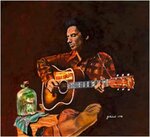

Located in the heart of Pampa stands a music center dedicated to one of the most prolific icons in American folk music, Woody Guthrie.
The Woody Guthrie Folk Music Center is Pampa’s tribute to the singer-songwriter. It was established as a 501 organization in 1991 by Thelma Bray and Glenna Lea Miller.
Guthrie was born on July 14, 1912, in Okemah, Oklahoma. He was the second-born son of Charles and Nora Belle Guthrie. His father – a cowboy, land speculator, and local politician – taught Guthrie Western songs, Indian songs, and Scottish folk tunes. His Kansas-born mother, also musically inclined, had an equally profound effect on Woody.
From his experiences in Okemah, Guthrie’s uniquely wry outlook on life, as well as his abiding interest in rambling around the country, was formed.
In 1929, when Okemah’s boomtown period went bust, Guthrie left for Texas. In the panhandle town of Pampa, he fell in love with Mary Jennings, the younger sister of a friend and musician named Matt Jennings. Guthrie and Mary were married in 1933 and together had three children, Gwen, Sue, and Bill.
By the time he arrived in California in 1937, Guthrie had experienced intense scorn, hatred, and even physical antagonism from resident Californians, who opposed the massive migration of the so-called “Okie” outsiders.
The local radio airwaves also provided Guthrie with a forum from which he developed his talent for controversial social commentary and criticism. On topics ranging from corrupt politicians, lawyers, and businessmen to praising the compassionate and humanist principles of Jesus Christ, the outlaw hero Pretty Boy Floyd, and the union organizers that were fighting for the rights of migrant workers in California’s agricultural communities, Guthrie proved himself a hard-hitting advocate for truth, fairness, and justice.
Guthrie strongly identified with his audience and adapted to an “outsider” status, along with them. This role would become an essential element of his political and social positioning, gradually working its way into his songwriting; “I Ain’t Got No Home”, “Goin’ Down the Road Feelin’ Bad”, “Talking Dust Bowl Blues”, “Tom Joad” and “Hard Travelin’”; all reflect his desire to give voice to those who had been disenfranchised.
Guthrie died on October 3, 1967, while at Creedmoor State Hospital in Queens, New York. His ashes were sprinkled into the waters off Coney Island’s shore.
In his lifetime, Guthrie wrote nearly 3,000 song lyrics, published two novels, created artworks, and authored numerous published and unpublished manuscripts, poems, prose, plays, and hundreds of letters and news articles.
Guthrie’s music has inspired generations of fans. The Woody Guthrie Folk Music Center stands as a testament to Guthrie’s legacy.
Michael Sinks is the Executive Director of the music center. Sinks recounts the moment that led him to the life he knows today.
“Back then, I had driven by the folk music center hundreds of times. I knew who Woody Guthrie was and that he was a union guy, that’s all I really knew,” Sinks said. “After I retired, I had some time and went to get a haircut. The barbershop was next to the folk music center. The barber, who played guitar like I did, told me, ‘You should go next store tonight, they’re having a jam session.’ I went to that jam session, and I’ve been here ever since.”
It was at that jam session that Sinks met the founder of the Woody Guthrie Folk Music Center, Mrs. Bray. She invited Sinks to attend a board meeting being held the next day. Since then, Sinks has dedicated his time to the music center.
“I just came here to play music one night. I had no intention of spending the next decade-plus here,” Sinks chuckled. “It’s been wonderful. I’ve got to meet all these great people, I get to play music, and I’ve gotten to learn all about Woody Guthrie.”
The Woody Guthrie Folk Music Center hosts free weekly music jam sessions on Friday evenings from 6:30 pm to 8:00 pm. Also, people are invited to visit the folk music center from Tuesday through Friday to learn about the impact Guthrie had on music history.
The folk music center also doubles as a live music venue! Bands and musicians from all over the world have performed at the Woody Guthrie Folk Music Center. In his office, Sinks has a wall adorned with signatures from all the musicians who have performed at the folk music center.
“They’ve come from all over the world,” Sinks said. “From Cambodia to France and from here to Australia. They have all put their signatures on the wall.”
In addition to hosting musicians, The Woody Guthrie Folk Music Center has partnered with Windows On A Wider World to provide students from across the panhandle of Texas an educational opportunity to learn about Guthrie and music as a whole.
“Thanks to Anita Gullett, from the White Deer Land Museum, we are now part of Windows On A Wider World,” Sinks said. “At the beginning of the year, the program schedules various schools to bring their students here. We see 600 to 800 students a year thanks to that program.”
Sinks expressed his sincerest appreciation and amazement for the support the folk center has received.
“There are people of every age group and demographic that come here,” Sinks said. “This is exactly how Woody would have wanted it to be. Music for everybody.”
For more information about The Woody Guthrie Folk Music Center, call (806) 665-0883 or visit 320 S. Cuyler St.
*** Sections of this article were provided by www.woodyguthriepampatx.com.